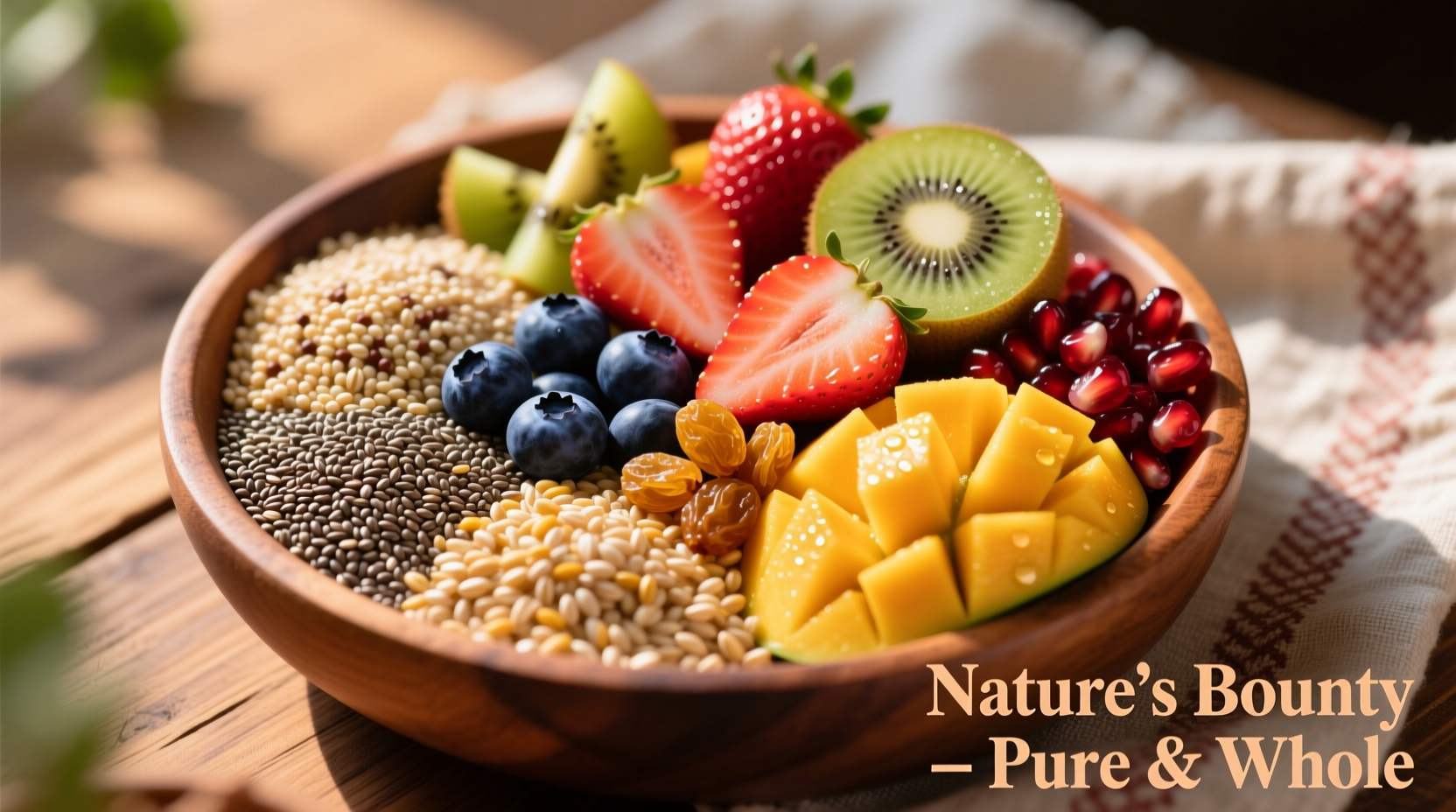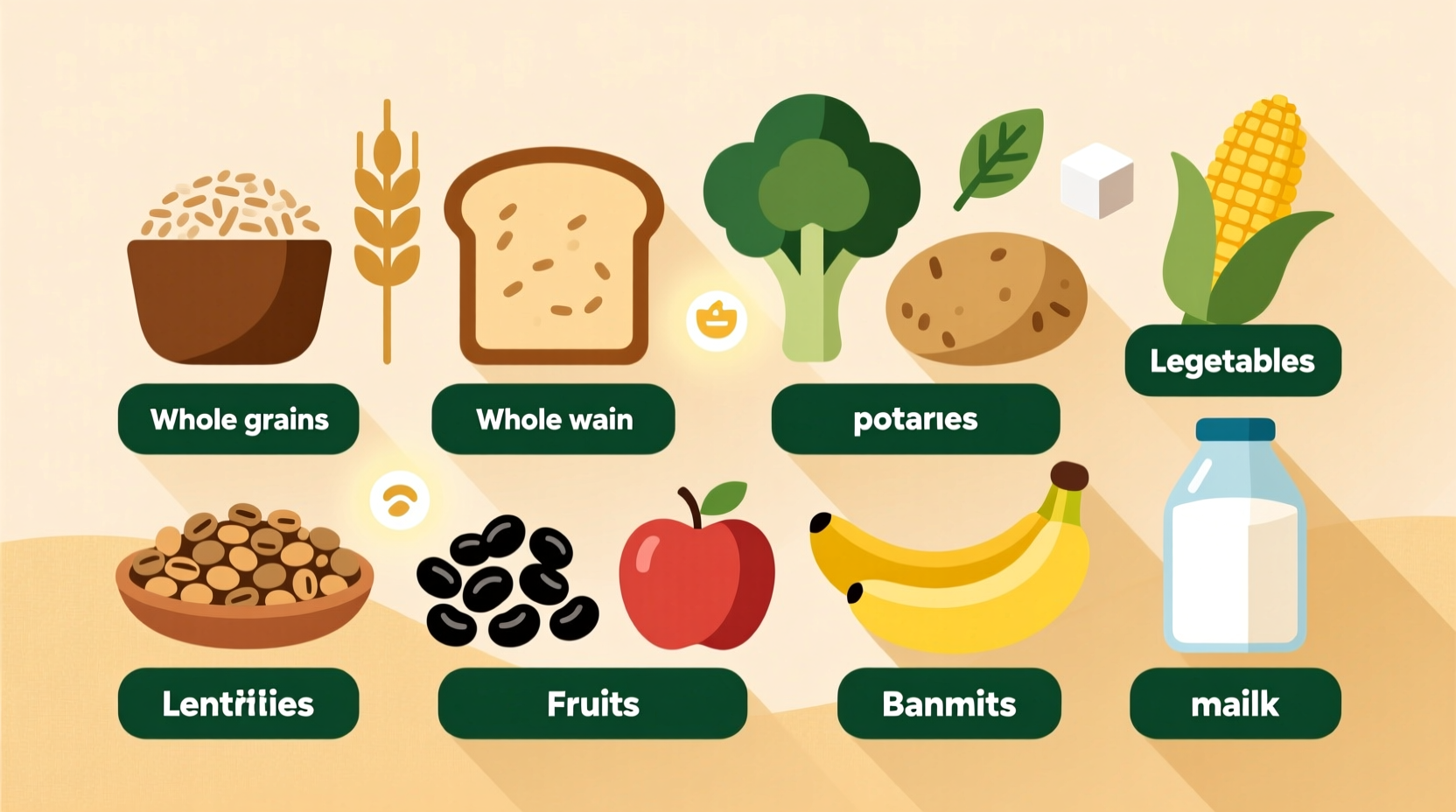Understanding carbohydrate sources is crucial for balanced nutrition, whether you're managing blood sugar, fueling athletic performance, or simply making healthier food choices. This guide provides science-backed information about carbohydrate-containing foods, organized to help you quickly find the information you need.
What Exactly Are Carbohydrates?
Carbohydrates are one of three macronutrients essential for human health, alongside proteins and fats. They serve as your body's primary energy source, breaking down into glucose that fuels your brain, muscles, and organs. Contrary to popular diet trends, carbohydrates aren't inherently bad—your body needs them to function properly. The key lies in choosing high-quality carbohydrate sources that provide sustained energy and essential nutrients.
Types of Carbohydrates: Simple vs. Complex
Not all carbohydrates affect your body the same way. Understanding the difference between simple and complex carbs helps you make better food choices:
- Simple carbohydrates consist of one or two sugar molecules. They're found naturally in fruits (fructose) and dairy (lactose), but also in processed sugars like table sugar (sucrose) and high-fructose corn syrup. Simple carbs provide quick energy but often lack fiber and nutrients.
- Complex carbohydrates contain longer chains of sugar molecules. Found in whole grains, legumes, and starchy vegetables, they take longer to digest, providing sustained energy and typically containing more fiber, vitamins, and minerals.
Top Food Categories Containing Carbohydrates
1. Whole Grains and Cereals
Whole grains provide complex carbohydrates along with fiber, B vitamins, and minerals. Unlike refined grains, whole grains retain all parts of the grain kernel.
| Food | Carbohydrates per 100g | Fiber Content | Glycemic Index |
|---|---|---|---|
| Quinoa (cooked) | 21g | 2.8g | 53 |
| Brown rice (cooked) | 28g | 1.8g | 68 |
| Oats (cooked) | 12g | 1.7g | 55 |
| Whole wheat bread | 49g | 7g | 74 |
According to the Dietary Guidelines for Americans 2020-2025, at least half of your grain intake should come from whole grains. This recommendation is based on extensive research showing that whole grains reduce the risk of heart disease, type 2 diabetes, and certain cancers.
2. Fruits: Nature's Sweet Carbohydrate Sources
Fruits contain natural sugars (fructose) along with fiber, vitamins, and antioxidants. While all fruits contain carbohydrates, their glycemic impact varies significantly.
Berries generally have lower carbohydrate content compared to tropical fruits. For example, 100g of strawberries contains about 7.7g of carbohydrates, while the same amount of mango contains approximately 15g. The fiber in whole fruits slows sugar absorption, making them a healthier choice than fruit juices or processed foods with added sugars.

3. Vegetables: The Carb Spectrum
Vegetables vary widely in carbohydrate content. Non-starchy vegetables like leafy greens, broccoli, and peppers contain minimal carbohydrates, while starchy vegetables are significant carb sources:
- Non-starchy vegetables (3-7g carbs per 100g): Spinach, kale, broccoli, asparagus, zucchini
- Starchy vegetables (15-25g carbs per 100g): Potatoes, sweet potatoes, corn, peas, winter squash
The Centers for Disease Control and Prevention recommends filling half your plate with fruits and vegetables at each meal. This approach ensures adequate fiber intake while managing overall carbohydrate consumption.
4. Legumes: Protein and Carb Powerhouses
Beans, lentils, and chickpeas offer an excellent combination of carbohydrates and plant-based protein. A 100g serving of cooked lentils contains approximately 20g of carbohydrates and 9g of protein, along with substantial fiber.
Research published in the American Journal of Clinical Nutrition shows that regular legume consumption is associated with improved blood sugar control and reduced risk of cardiovascular disease. Their low glycemic index makes them particularly valuable for people managing diabetes.
5. Dairy Products: Natural Sugars in Milk
Dairy contains lactose, a natural sugar. While milk and yogurt contain carbohydrates, cheese typically has minimal carbs.
- Plain yogurt (100g): 4g carbohydrates
- Milk (100ml): 5g carbohydrates
- Cheese (100g): 1-2g carbohydrates
Choose plain, unsweetened dairy products to avoid added sugars. The naturally occurring lactose in dairy comes with protein and calcium, making it a more balanced carbohydrate source than many processed alternatives.
6. Sugars and Sweeteners: Understanding Added Carbs
Added sugars contribute significant carbohydrates without nutritional benefits. Common sources include:
- Soda and sweetened beverages
- Candy and baked goods
- Processed foods (even savory ones like sauces and dressings)
The American Heart Association recommends limiting added sugars to no more than 25g per day for women and 36g for men. Reading nutrition labels helps identify hidden carbohydrates in processed foods.
Practical Tips for Managing Carbohydrate Intake
Reading Nutrition Labels for Carbohydrates
When evaluating food products, pay attention to:
- Total carbohydrate content per serving
- Fiber content (higher is better)
- Sugars (distinguish between natural and added sugars)
- "Includes Xg Added Sugars" line (required on newer labels)
Remember that serving sizes can be deceiving—always check how many servings are in the container.
Carbohydrate Quality vs. Quantity
Focusing solely on carbohydrate quantity misses the bigger picture. Consider these factors:
- Glycemic index: How quickly a food raises blood sugar
- Nutrient density: Vitamins, minerals, and fiber accompanying the carbs
- Processing level: Whole foods generally provide better nutrition than processed alternatives
A study from Harvard University demonstrates that replacing refined grains with whole grains reduces the risk of type 2 diabetes by 20-30%, highlighting the importance of carbohydrate quality.
Diet-Specific Considerations
Different dietary approaches manage carbohydrates differently:
- Mediterranean diet: Emphasizes whole grains, fruits, vegetables, and legumes while limiting refined carbs
- Diabetes management: Focuses on consistent carbohydrate intake and low-glycemic foods
- Athletic performance: May require strategic carbohydrate timing for optimal energy
Consult with a registered dietitian to determine the right carbohydrate approach for your individual health needs and goals.
Common Questions About Carbohydrate-Containing Foods
Which vegetables have the lowest carbohydrate content?
Leafy greens like spinach, kale, and lettuce contain minimal carbohydrates (typically 1-3g per 100g). Other low-carb vegetables include broccoli, asparagus, zucchini, and bell peppers. These non-starchy vegetables provide essential nutrients with minimal impact on blood sugar levels.
Do all fruits contain significant carbohydrates?
Yes, all fruits contain carbohydrates in the form of natural sugars, but the amount varies significantly. Berries generally have lower carbohydrate content (5-10g per 100g) compared to tropical fruits like mangoes and bananas (15-20g per 100g). The fiber in whole fruits helps moderate blood sugar impact compared to fruit juices.
How can I identify hidden carbohydrates in processed foods?
Read nutrition labels carefully and check the ingredients list for hidden sugars, which can appear as high-fructose corn syrup, maltose, dextrose, cane juice, or any word ending in "-ose." Be aware that many processed foods like sauces, dressings, and even savory snacks contain added sugars. The "Includes Xg Added Sugars" line on newer nutrition labels helps identify these hidden carbohydrates.
Are whole grains really better than refined grains?
Yes, whole grains retain all parts of the grain kernel (bran, germ, and endosperm), providing more fiber, vitamins, and minerals than refined grains. Research shows that replacing refined grains with whole grains reduces the risk of type 2 diabetes by 20-30% and improves heart health. Whole grains also have a lower glycemic index, leading to more stable blood sugar levels.
Can I get enough fiber without eating grains?
Yes, you can get adequate fiber from non-grain sources. Excellent alternatives include legumes (beans, lentils, chickpeas), vegetables (especially broccoli, Brussels sprouts, and artichokes), fruits (particularly berries and apples with skin), nuts, and seeds. A varied diet rich in plant-based foods can provide sufficient fiber even without grains.











 浙公网安备
33010002000092号
浙公网安备
33010002000092号 浙B2-20120091-4
浙B2-20120091-4